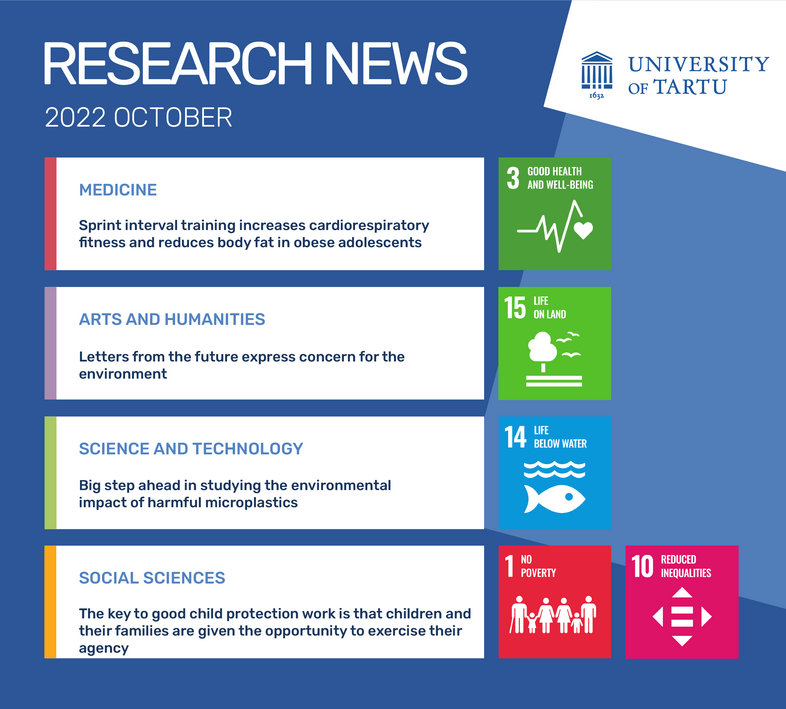Research news: effective child protection, imagining a post-pandemic future, training obese boys, and harmful microplastics

Social Sciences
The key to good child protection work is that children and their families are given the opportunity to exercise their agency
In recent years, the number of children in contact with a child protection worker has grown rapidly in Estonia, and the number of child protection workers has also increased. University of Tartu researchers studied how children and their parents or guardians rate their experiences with child protection workers.
A large proportion of respondents felt they did not have enough opportunities to influence the process of helping. Children, in particular, said that their opinion did not matter enough for specialists and that child protection workers did not have enough time for them.
The participants in the study believe that child protection work is effective when both children and adults are sufficiently informed of the situation, their opinions are taken into account and appreciated, and they are given opportunities to actively participate in the helping process and make changes in their lives. The results are based on a survey conducted in 2020 to which responses were received from 217 children and 505 adults all over Estonia.
Read more in the article published in the journal Child Indicators Research.
Further information:
Tuuli-Brit Vaga, doctoral student of Sociology, tuulibrit@hotmail.com
Dagmar Kutsar, Associate Professor of the Institute of Social Studies, dagmar.kutsar@ut.ee
Arts and Humanities
Letters from the future express concern for the environment
During the first wave of the coronavirus pandemic in 2020, researchers from eight countries conducted an international survey of letters from the future. 277 people from 30 countries were asked to write themselves a letter from the future, describing their imagined daily life and life in society.
University of Tartu researchers examined the letters to see how the pandemic had affected people’s daily habits and experiences; what changes had occurred in their perception of familiar environments such as home, the city or virtual space, and the temporality associated with them; and how the changes, in turn, affected the perceptions of the post-corona world and future challenges. The letters reflect people’s environmental concerns. In the descriptions of the new spatiotemporal relations, the keywords are slowness (slowdown), closeness, interconnection and care.
The descriptions of urban and rural life contained an almost equal proportion of positive and negative scenarios. The positive aspects included sustainable lifestyles, the green transition, domestic production, gardening, new types of energy sources, and smart technologies. The negative scenarios included habitual isolation, population decline, diseases, destruction of the natural environment, and the harmful effects of technology.
The Letters from the Future project enabled a more exhaustive analysis of the impact of the pandemic on people’s mutual relationships, attitudes to nature protection and ideas of sustainable development.
Read more in the article published in the journal Futures.
Further information: Marina Grišakova, Professor of Literary Theory, marina.grisakova@ut.ee
Medicine
Sprint interval training increases cardiorespiratory fitness and reduces body fat in obese adolescents
Obesity is a serious problem that has dramatically increased worldwide, especially among children and adolescents. University of Tartu researchers studied the influence of supervised sprint interval training on cardiorespiratory fitness (i.e. the ability of the heart and lungs to supply oxygen to muscles during physical activity) and body composition of obese boys.
Twenty-eight adolescents who participated in the study were allocated to an intervention group and a control group. On three days per week over 12 weeks, the training group performed four to six 30-second cycling bouts with a four-minute active recovery between each bout. The non-exercising control group continued their normal daily activities.
It was found that the cardiorespiratory fitness of the adolescents in the training group improved, and their body fat percentage decreased considerably. The study revealed that 12-week sprint interval training is an efficient way to enhance physical fitness and may quickly reduce health risks.
Read more in the article published in the Journal of Sports Sciences.
Further information: Marit Salus, doctoral student at the Institute of Sport Sciences and Physiotherapy, marit.salus@ut.ee
Science and Technology
Big step ahead in studying the environmental impact of harmful microplastics
A tenth of all plastic waste eventually ends up in the oceans, where it breaks down into microplastics under the effect of light, friction, waves, temperature fluctuations, etc. Direct exposure to and ingestion of microplastics can damage organisms’ metabolism, nutrition, growth rate and reproductive capacity. This is why concerns about the methodological shortcomings and reliability of studies on the effects of microplastics have grown exponentially over the last decade. For example, the concentration of microplastics used in experiments is often higher than in the aquatic environment. The types of microplastics used are not found in nature, or the impact studies are too short-term or focus on a single life stage of an organism.
University of Tartu researchers have drafted a new design for an ‘ideal’ microplastics study and recommendations for conducting such studies in the future. In addition, based on the reliability indicators of previous impact studies, the researchers performed a meta-analysis to assess the actual effects of microplastics on marine life. The effects were found to be greater than traditional meta-analyses have shown. The new analytical framework will enable, in the future, to design ecologically relevant and technically sound experiments to further improve knowledge of the environmental impact of microplastics.
Read more in the article published in the journal Science of The Total Environment.
Further information: Jonne Kotta, marine biologist, jonne@sea.ee





